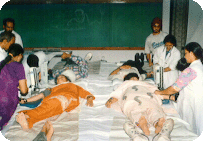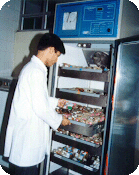
Department of Transfusion Medicine

- 3 Demonstrators,14 Nos. PG/JR's
| What is Blood Donation ? | (Size: 24.7 KB, Format: PDF, Language: English) |
| Myths and Realities - about blood donation | (Size: 24.1 KB, Format: PDF, Language: English) |
| Post donation Care | (Size: 10.7 KB, Format: PDF, Language: English) |
| Platelet Donation (Apheresis platelets) | (Size: 26.7 KB, Format: PDF, Language: English) |
| Frequently asked questions | (Size: 25 KB, Format: PDF, Language: English) |
Transfusion Medicine has now emerged as a distinct speciality which is not limited to blood bank laboratory but has reached the patient’s bedside. Last few decades have witnessed rapid technological advances which have changed the scope and scenario of transfusion medicine services.

The Department of Transfusion Medicine, Govt. Medical College and Hospital has grown over the years from a small blood bank unit licensed in 1996 to a fully equipped modern blood component separation unit with facilities for plateletpheresis. Presently, the department is functioning from its new premises in D-Block since 2008. Besides providing round the clock services for blood and blood components to GMCH patients, the department also caters to the needs of patients admitted in private hospitals and nursing homes, civil hospitals, dispensaries of Chandigarh and the adjoining region. The department is also running the post graduate course in Transfusion Medicine since 2009.
Transfusion Medicine Services
The Transfusion Medicine services are organized into following functional areas.
Donor Complex
The donor complex remains open throughout the year for the convenience of donors. Facilities for autologous and directed donations are also available. The donor is received in the reception area of the donor complex and given pre donation counseling and necessary information. A qualified doctor screens the prospective donor to determine his/her suitability for blood donation. This is followed by donor registration. The next step is phlebotomy and blood collection. During post donation, the donor is kept under observation and refreshment is provided. A trained counselor is available for pre donation and post donation counseling. All first time donors are encouraged to become regular repeat donors. The department provides facility for registration of donors for the emergency panel to meet blood and blood component demands during shortages and specific group requirements.
Component section
The department has now facility of leucoreduced components. Blood component separation enables optimum utilization of a scarce resource and promotes rational use of blood. The Blood Bank at GMCH has been upgraded to a modern blood component separation unit by National AIDS Control Organization. The various blood components available are : » Packed red blood cells. » Fresh Frozen Plasma. » Platelet concentrate. » Cryoprecipitate.
Transfusion Transmitted Infection Screening Laboratory
Transfusion Transmitted Infection Screening Laboratory
Apheresis
The department has three cell separator machines. Apheresis technology is a form of extra corporeal therapy with an enormous potential both for harvesting good quality components from healthy donors and as a therapeutic modality. Apheresis platelets are of better quality as compared to random donor platelets and the use of apheresis platelets in select clinical situations is more beneficial to the patient. However, the plateletpheresis procedure requires technical expertise, dedicated donors and is also more expensive. The department has a cell separator machine enabling the removal of the desired blood component particularly platelets from blood donors for use in patients. Apheresis services are provided round the clock by the department.The department has also facility of Therapeutic plasma exchange.
Serology Laboratory
Blood requisitions are received and blood/components are issued at the reception counter round the clock. Various immunohematological tests are performed in the serology laboratory . These include:1. Blood grouping (ABO and Rh) of donors and patients.2. Cross matching.3. Direct Coomb’s test.4. Indirect Coomb’s test.Rh clinic is run on every Thursday for antibody screening of samples of Rh negative antenatal patients.
Special Immunohematology Section
This section is dedicated to evaluation of feto maternal blood group incompatibility and work up of immune hemolytic anemias. The testing is performed by gel technology.The department has registered about 157 patients of thalassemia who receive regular transfusions. Extended red cell phenotype is done in special cases. The tests performed include:1. Antibody screening2. Antibody identification3. Red cell phenotyping
Quality Control Laboratory
In order to ensure provision of safe and quality blood, regular quality control checks are done for all reagents, antisera, blood components and equipment as per prescribed standards. The department also participates in external quality assurance programme.
Outdoor Blood Donation Drive
The department organizes regular voluntary blood donation camps (20-25/month) with various religious and social organizations, corporate offices and educational institutions. Over 85% of the blood comes from voluntary blood donors. Nearly 60-65% of donors are regular repeat donors. A fully equipped mobile van is available for blood donation camps which are held in and around Chandigarh. Donor motivation talks are given before the camps in colleges, offices and social gatherings to promote voluntary blood donation and increase awareness among the people. The department also celebrates National Voluntary Blood Donation Day on 1st October and World Blood Donor Day on 14th June to appreciate the efforts of voluntary blood donors and donor organizations. Donor cards and certificates are given to all voluntary blood donors and master cards are issued to donors with five or more donations.
Research & Training
| Sr No. | Training and Courses |
|---|---|
| 1. | MD Transfusion Medicine: The department has started with the post graduate course in Transfusion Medicine in 2009. The post graduate students are given extensive training in the form of regular technical discussions, seminars, journal reviews and other academic presentations. Practical expertise in each section is ensured. |
| 2. | Post graduate students of Pathology : The students of MD Pathology are posted in Transfusion Medicine. During their tenure they are taught basic concepts of blood banking. |
| 3. | Other paramedical disciplines : B.Sc (MLT) and B.Sc (Anaesthesia and OT Technique) students are also posted for training in Transfusion Medicine. Theory and practical classes are conducted as per schedule for these students. |
| Besides guiding post graduate students for their MD thesis, the departmental faculty members are also involved in various research projects. |





